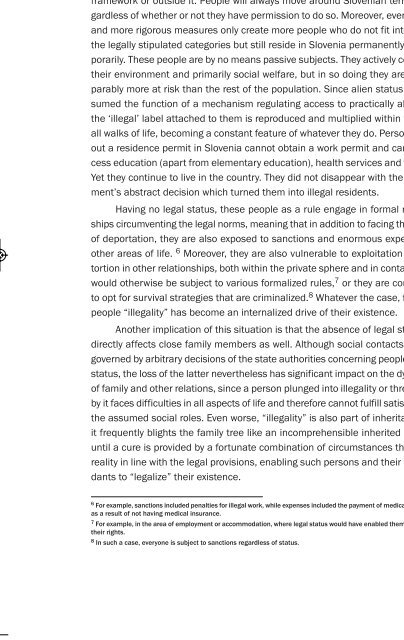The Scars of the Erasure_web
The Scars of the Erasure_web
The Scars of the Erasure_web
- No tags were found...
Create successful ePaper yourself
Turn your PDF publications into a flip-book with our unique Google optimized e-Paper software.
<strong>Erasure</strong>_4a 10.1.11 20:29 Page 6060 THE SCARS OF THE ERASUREOver <strong>the</strong> past two decades Slovenia has thus created, in collaboration witho<strong>the</strong>r countries, particularly EU member states, a vast and complex apparatusfor dealing with aliens. However, experience shows that human mobility cannever be fully controlled and even less managed, be it migration within a legalframework or outside it. People will always move around Slovenian territory regardless<strong>of</strong> whe<strong>the</strong>r or not <strong>the</strong>y have permission to do so. Moreover, ever stricterand more rigorous measures only create more people who do not fit into any <strong>of</strong><strong>the</strong> legally stipulated categories but still reside in Slovenia permanently or temporarily.<strong>The</strong>se people are by no means passive subjects. <strong>The</strong>y actively co-shape<strong>the</strong>ir environment and primarily social welfare, but in so doing <strong>the</strong>y are incomparablymore at risk than <strong>the</strong> rest <strong>of</strong> <strong>the</strong> population. Since alien status has assumed<strong>the</strong> function <strong>of</strong> a mechanism regulating access to practically all rights,<strong>the</strong> ‘illegal’ label attached to <strong>the</strong>m is reproduced and multiplied within virtuallyall walks <strong>of</strong> life, becoming a constant feature <strong>of</strong> whatever <strong>the</strong>y do. Persons withouta residence permit in Slovenia cannot obtain a work permit and cannot accesseducation (apart from elementary education), health services and <strong>the</strong> like.Yet <strong>the</strong>y continue to live in <strong>the</strong> country. <strong>The</strong>y did not disappear with <strong>the</strong> government’sabstract decision which turned <strong>the</strong>m into illegal residents.Having no legal status, <strong>the</strong>se people as a rule engage in formal relationshipscircumventing <strong>the</strong> legal norms, meaning that in addition to facing <strong>the</strong> threat<strong>of</strong> deportation, <strong>the</strong>y are also exposed to sanctions and enormous expenses ino<strong>the</strong>r areas <strong>of</strong> life. 6 Moreover, <strong>the</strong>y are also vulnerable to exploitation and extortionin o<strong>the</strong>r relationships, both within <strong>the</strong> private sphere and in contacts thatwould o<strong>the</strong>rwise be subject to various formalized rules, 7 or <strong>the</strong>y are compelledto opt for survival strategies that are criminalized. 8 Whatever <strong>the</strong> case, for suchpeople “illegality” has become an internalized drive <strong>of</strong> <strong>the</strong>ir existence.Ano<strong>the</strong>r implication <strong>of</strong> this situation is that <strong>the</strong> absence <strong>of</strong> legal status indirectlyaffects close family members as well. Although social contacts are notgoverned by arbitrary decisions <strong>of</strong> <strong>the</strong> state authorities concerning people’s legalstatus, <strong>the</strong> loss <strong>of</strong> <strong>the</strong> latter never<strong>the</strong>less has significant impact on <strong>the</strong> dynamics<strong>of</strong> family and o<strong>the</strong>r relations, since a person plunged into illegality or threatenedby it faces difficulties in all aspects <strong>of</strong> life and <strong>the</strong>refore cannot fulfill satisfactorily<strong>the</strong> assumed social roles. Even worse, “illegality” is also part <strong>of</strong> inheritance, soit frequently blights <strong>the</strong> family tree like an incomprehensible inherited diseaseuntil a cure is provided by a fortunate combination <strong>of</strong> circumstances that bringreality in line with <strong>the</strong> legal provisions, enabling such persons and <strong>the</strong>ir descendantsto “legalize” <strong>the</strong>ir existence.6 For example, sanctions included penalties for illegal work, while expenses included <strong>the</strong> payment <strong>of</strong> medical treatmentas a result <strong>of</strong> not having medical insurance.7 For example, in <strong>the</strong> area <strong>of</strong> employment or accommodation, where legal status would have enabled <strong>the</strong>m to exercise<strong>the</strong>ir rights.8 In such a case, everyone is subject to sanctions regardless <strong>of</strong> status.


